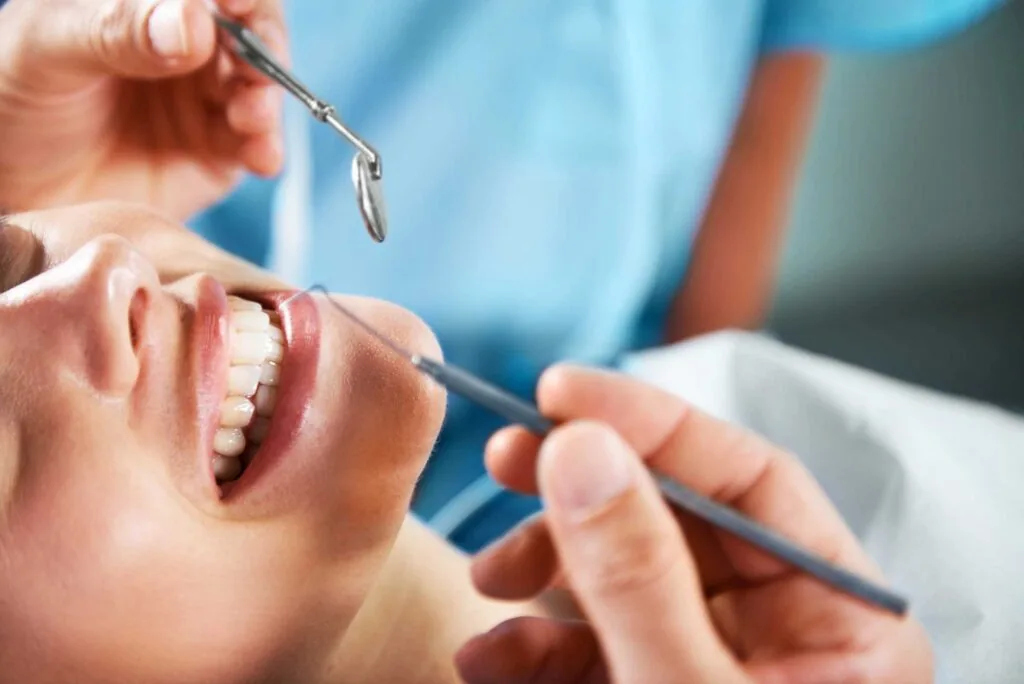Regular Dental Checkup
Regular dental checkups are crucial for maintaining oral health, preventing dental problems, and ensuring early treatment of any issues that arise.
Regular Dental Checkups
Dental checkups are critical for detecting early signs of oral health issues such as tooth decay, gum disease (gingivitis or periodontitis), and oral cancer. Early detection often results in more straightforward and more effective treatment options.
Your dental checkup should be completed every six months. They contribute significantly to your overall well-being, as poor oral health has been linked to various health conditions, including heart disease and diabetes.
Teeth cleanings, flossing, sealants, and fluoride are necessary to prevent periodontal disease. We focus on thorough exams to check your teeth, gums, and overall health. We are equally concerned about your smile and well-being at Endres Dental Care in Burtonsville, MD.
Is it time for your 6-month dental checkup? Schedule your dental cleaning today!
Schedule Appointment
-
What can I expect from my first hygiene appointment?
You can expect a typical new patient hygiene and cleaning appointment to go as follows:
Initial Examination
We will inspect your teeth, gums, and mouth for signs of decay, gum disease, or other oral health issues. Depending on your oral health history and the time since your last X-rays, we may take digital X-rays to detect tooth decay, bone loss, impacted teeth, or other problems not visible during the visual inspection.
Teeth Cleaning
Your hygienist will remove the plaque and tartar (hardened plaque) from your teeth’s surfaces and along the gumline. Tartar can’t be removed with brushing and flossing alone, so professional cleaning is necessary. Then your teeth are polished to remove surface stains and smooth the enamel, making it harder for plaque to cling.
Flossing
Your dental hygienist will then floss your teeth to remove any remaining plaque or food particles and to check for spots where the gums might bleed, indicating potential areas of concern.
Assessment and Treatment Plan
If any issues are detected during the checkup, X-rays, or cleaning your dentist will discuss these with you, including potential causes, treatment options, and recommendations for the next steps. This might include scheduling another appointment for specific treatments (e.g., fillings, root canals, or gum disease treatment).
Expect this first appointment to take between 1 hour and 1.5 hours, so that we ensure you have a comprehensive first visit.
-
Why are dental checkups important?
Many oral health concerns can only be detected through a thorough examination by a dentist. Dental checkups provide oral cancer screenings, digital X-rays to check for hidden issues and professional cleanings to eliminate plaque, bacteria, and other buildups that daily brushing and flossing won’t effectively eliminate.
Periodontal disease is the leading cause of tooth loss, so early intervention is essential. Once gum disease has taken its toll on the tooth and supporting bone, it cannot be restored but only managed or replaced. The dental hygienist will use a tiny ruler to gently measure the gum “pocket” around each of your teeth, noting areas you can’t clean with a toothbrush or floss. X-rays are used with these measurements to identify areas of bone recession.
-
How often should you get dental checkups?
The frequency of dental checkups can vary depending on individual health needs, but it’s commonly recommended to visit the dentist every six months for a routine checkup and cleaning. Some individuals may need more frequent visits, especially those with a higher risk of oral health diseases.
The American Dental Association, and most dentists, recommend six months because the maintenance and cleaning provided at each visit is the best way to ensure you maintain healthy teeth and gums.
As long as your mouth is free of gum disease and heavy buildup, six months is about the average length of time for tartar and stain to accumulate to the point of needing another teeth cleaning. For individuals with a history of periodontitis, those maintenance visits may need to be as frequent as every 3-4 months.
-
Why are brushing and flossing important?
We all know brushing and flossing make our mouth feel great. But, brushing and flossing do more than freshen breath – they physically disrupt the complex network of bacteria called a biofilm. It’s important to disrupt and remove the sticky film so diseases like cavities and gum disease are less likely to happen. There are a lot of products on the market that claim they are the best. Make sure to talk about the options with your hygienist to get the best recommendation.
And as you know, it is important to brush twice a day for at least two minutes, and floss once. If you have a hard time remembering to floss, connect it with a daily activity you always do. You can floss in the shower or while driving to work!
-
What are other preventative dental care strategies?
Besides having your teeth cleaned and stain polished off, our comfortable dental cleaning also provides other preventative services, such as:
Dental Sealants — Deep grooves and pits in your back teeth are at a higher risk of cavities. Placing a protective sealant over these surfaces makes them easier to clean and lowers your chances of developing tooth decay.
Fluoride Treatment — Fluoride strengthens tooth enamel, fights sensitivity, and reverses the earliest stage of tooth decay (demineralization). Dental insurance typically covers fluoride treatments for children, but our adult patients can take advantage of the service for a small fee.
Oral Cancer Screenings — This deadly disease is linked to viruses like HPV, sun exposure, and tobacco/alcohol use. Early screening could save your life. We complete a cancer exam as part of every checkup appointment. Over half of those in the U.S. survive oral cancer after five years, according to the National Institute of Dental Craniofacial Research, but it is critical it is caught early.
Diagnostic X-rays — Intermittent X-rays allow us to identify new areas of decay or bone loss around your teeth, so that we can treat them in the least invasive manner before they become worse.
Is It Time For Your Next Checkup?
If you have more questions about dental checkups and other preventative dental care, please contact our office and we will be happy to discuss further.

